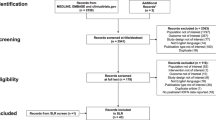Abstract
The incidence of rhesus haemolytic disease has been markedly reduced. Affected infants who have had intrauterine transfusions suffer a late hyporegenerative anaemia. Postnatal haemolysis and hence treatment for hyperbilirubinaemia is less commonly needed. Optimal phototherapy reduces the need for postnatal exchange transfusions, but data on the efficacy of inhibitors of bilirubin production such as haem oxygenase inhibitors or immunoglobulin are less secure. Even hydropic infants have less than 20% mortality and bilirubin encephalopathy is uncommon. There is, however, very limited information on the long-term outcome of infants with rhesus haemolytic disease.
Conclusion Multicentre collaboration is required to test strategies to improve the management of affected individuals further and to provide meaningful data on their prognosis.
Similar content being viewed by others
Author information
Authors and Affiliations
Additional information
Received and accepted: 13 January 1999
Rights and permissions
About this article
Cite this article
Greenough, A. Rhesus disease: postnatal management and outcome. Eur J Pediatr 158, 689–693 (1999). https://doi.org/10.1007/s004310051180
Issue Date:
DOI: https://doi.org/10.1007/s004310051180




